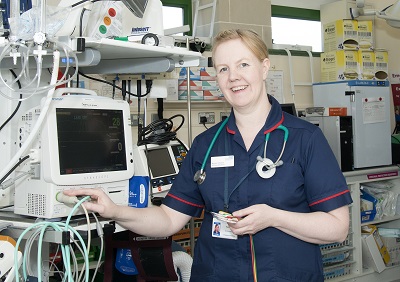

 Meet Karen Chivers, a consultant nurse and the first advanced clinical practitioner (ACP) working in our emergency departments (ED).
Meet Karen Chivers, a consultant nurse and the first advanced clinical practitioner (ACP) working in our emergency departments (ED).
Karen, who is based at Wexham Park Hospital, successfully credentialed with the Royal College of Emergency Medicine (RCEM) as an ACP at the end of 2022.
Working as an ACP means that Karen makes autonomous decisions affecting every aspect of clinical care for adults presenting to ED with undifferentiated problems. She also helps junior doctors in their decision making and reviewing of their patients.
We asked her about her motivations and journey toward ACP status, which is equivalent to a medical registrar ST3/4.
How do you feel now that you have been credentialed by the Royal College of Emergency Medicine (RCEM)?
I am relieved that I have met the criteria to be recognised by the RCEM as a credentialed ACP. I am also proud that I did persevere, and now can help to encourage and support others who are undertaking the course. I am hoping to inspire the next generation of ACP’s across the Trust and nationally. In turn, I couldn’t have done it without the ED team in Wexham who supported me throughout my journey, with both the ups and the downs.
Where did your journey start?
I started my nurse consultant training and advanced clinical practitioner course when I was seconded to HEE/Oxford University Hospitals around six years ago. I continued building up my portfolio when I returned to the Trust.
How long did it take to be credentialed? Why?
It took between five and six years to complete, with me having to really concentrate on it for the past three years. It’s a long process because the collation of information and evidence is very time-consuming.
What type of information and evidence did you have to collate?
I needed to demonstrate that I had competencies in assessing, diagnosing, treating, decision-making and prescribing. For emergency medicine, the e-portfolio has to be completed in line with the requirements of the RCEM: patients, evidence of research and quality. There are over 150 different areas of competencies to complete, divided into core competencies (basic skills in assessing patients, communication, legal and ethical issues, research skills), acute presentations, major presentations, trauma patients and procedural competencies. There also needs to be feedback from colleagues within ED every year, feedback from patients and quality improvement projects.
That seems a lot. Why this role?
I have never wanted to do a solely managerial role as I enjoy working with staff and treating patients. ED is a dynamic environment where you always have to think on your feet, so each day is challenging. The consultant nurse role with ACP time helps me to have the best of both worlds - I care for patients clinically, I can develop a quality improvement plan (QIP) to support patients and staff, plus I can educate and undertake research too.
Who has supported you on your journey?
My manager, Angela Ballard, head of nursing for emergency medicine, encouraged me to apply for the consultant nurse training and subsequently supported my secondment.
My supervisor, Francoise Ticehurst, ED consultant, has been supportive and encouraging throughout the process. It has been a huge workload for her as neither of us appreciated how much detail would be needed in demonstrating my ability to perform at the highest level of practice.
Having a supervisor who believes in and has an insight into the process, has attended the supervisor training day and recognises the benefit of having ACPs as part of the workforce makes a huge difference. And, of course, Wexham’s ED team who have supported me throughout.
What would you say to anyone wanting to follow in your footsteps? Any advice?
Be prepared. It is a large undertaking and assessment is very rigorous both at a local level and national level. Perseverance and resilience are key.
Be prepared for some negative comments, understand that it is probably because individuals do not understand the role. Be prepared to explain to patients and medical staff what your role entails. I have often had to repeat this but have not received any negative feedback from patients.
Always be prepared to ask questions, consider the responses and learn, learn, learn.
What’s next… writing articles and delivering lectures
While collating data, I used my non-clinical time to publish articles. So far I have had two articles published in the Emergency Nurse Journal’ one on snakebites (not a common occurrence in the UK) and the other on accidental hypothermia (which we have seen a huge amount of this year). I also have had a chapter on ear, nose and throat (ENT) published in Advanced Clinical Practice at a Glance, 2022.
After publishing these I was invited to deliver a lecture on snakebites at the World Nursing Congress, San Francisco, USA, in April.
How do you feel about presenting to the World Nursing Congress?
It’s a little daunting but I have been supported by the Trust and am looking forward to raising the profile of Frimley Health NHS Trust.
Anything you would like to add?
I would encourage anyone to try and write an article as it not only increases your knowledge but it promotes your role and the Trust. You never know where it may lead.

